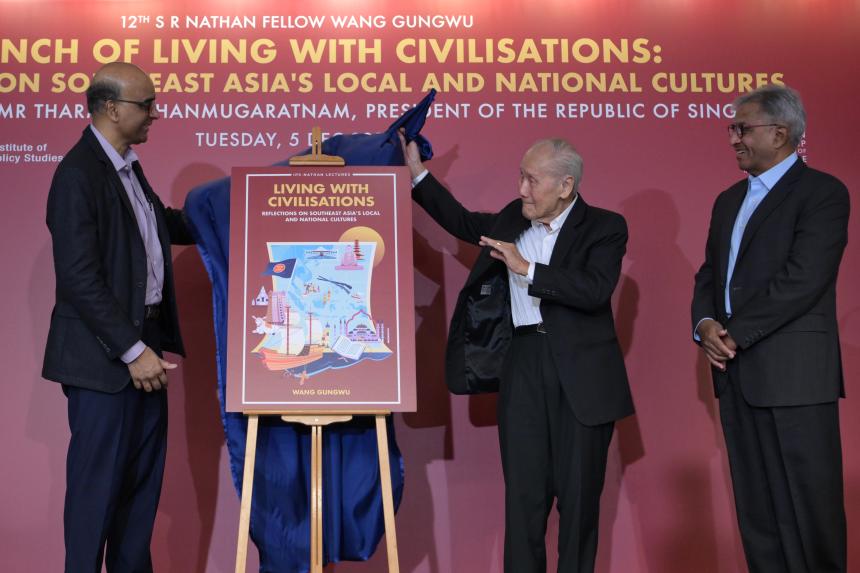SINGAPORE - Not having an indigenous civilisation, but rather a set of evolving cultures, has helped South-east Asian nations be open and inclusive, and given them resilience, said President Tharman Shanmugaratnam at the Institute of Policy Studies (IPS) on Dec 5.
Drawing on insights from a new book by eminent historian Wang Gungwu, Mr Tharman noted that South-east Asia has never comprised a civilisation of its own. Instead, its local and national cultures were shaped by external influences, in particular the four ancient civilisations: Indic, Sinic, Islamic and European-Christian.
Countries in the region did not adopt any one of those civilisations holistically or singularly, but selected elements from these different civilisations and integrated them within their own evolving national cultures, he said. This enabled South-east Asia to selectively modernise, in order to preserve its own evolving set of cultures.
“I would add that this open and inclusive trait that runs through South-east Asia’s histories gives the region resilience in today’s world and, I’m sure, equally significantly the world of tomorrow.”
He was speaking at the launch of Living With Civilisations: Reflections On Southeast Asia’s Local And National Cultures by Professor Wang, who is IPS’ 12th S R Nathan Fellow for the Study of Singapore.
Mr Tharman said that the ability to selectively incorporate different civilisations from around the world enables the nations of the region to navigate, each in its own way, the tensions and tides of a changing world. It better enables them to avoid being pulled and tugged by those contemporary impulses.
This was always significant for Singapore, which was continually exposed to those different civilisational influences. The British who ruled Singapore did not try to change this, he said.
He added that Singapore’s majority community – the Chinese – had a long history of being a minority community in South-east Asia.
“That long experience of being a minority community in different parts of South-east Asia does appear to have shaped a distinct ethos among the Chinese who settled in Singapore. And that itself has helped us to become a multiracial society in a fuller sense after independence,” he said.
The openness and inclusiveness of cultures in South-east Asia, and the fact that none of the individual nations or the region as a whole regards itself as a civilisation in its own right, is an advantage in today’s world, Mr Tharman said.
“It gives us the humility that allows us to keep learning, and never to think that we’re superior to the rest of the world.”
The region will go through periods where there will be a tendency for any one of these other national cultures, the homes of the major civilisations, to believe that they represent the best of human values, or the best interests of humanity.
Mr Tharman highlighted two important lessons in the book. First, it is important for Singapore to stay united within Asean, as is its intention. Second, it is important for Asean to be united and to prevent its multi-civilisational cultures from ever descending into the warring nationalist cultures abroad that threaten the world today.
He added: “For each of the civilisations that have shaped us and continue to shape us, we should always distinguish between the enduring civilisational ideas and values and the contemporary national cultures, temperaments and impulses in the parts of the world that they came from. That, too, is how we retain our resilience.”
The 201-page book is a collection of the four IPS-Nathan lectures that Prof Wang delivered from November 2022 to March 2023, and includes highlights of his dialogue with the audience.
The 93-year-old has been a professor at the National University of Singapore (NUS) since 2007, and emeritus professor at the Australian National University since 1988. He was also director of NUS’ East Asian Institute from 1997 to 2007.

In his address at the event, Prof Wang said South-east Asia consists of modernising nations in search of a regional identity. Its numerous polities had over three millennia enriched their local cultures by selecting what they needed from the four ancient civilisations.
After the 18th century, global imperial powers expanded to dominate the world with their modern civilisation.
“Although our region came under their control, its local communities stayed in contact with the ancient civilisations. The region’s leaders observed how the civilisations responded to modernisation without adopting any single model,” said Prof Wang. “As in the past, South-east Asian communities remained open and inclusive as they enabled their local cultures to evolve to become modern national cultures.”
Prof Wang added: “Singapore as an independent republic has many unique features. But it has shared this experience of openness and inclusivity. It chose to be modern in its own way and joined the region in supporting the search for a peaceful way for all civilisations to live together.”
He said: “I respect the integrity of national cultures everywhere but believe that none today can claim that it stands for the universal values for all humankind.”
Calling Prof Wang “the most significant scholar in the humanities living in Singapore today”, IPS director Janadas Devan said the book is a guide to understanding the forces that have shaped the region, and challenges the readers to reflect on the past to better navigate the present and future.
- Living With Civilisations: Reflections On Southeast Asia’s Local And National Cultures is priced at $28 (soft cover) and $46 (hard cover), excluding GST. There is 20 per cent off with the promo code WSIPS20, valid till Jan 31, 2024. The book can be purchased at https://doi.org/10.1142/13638


